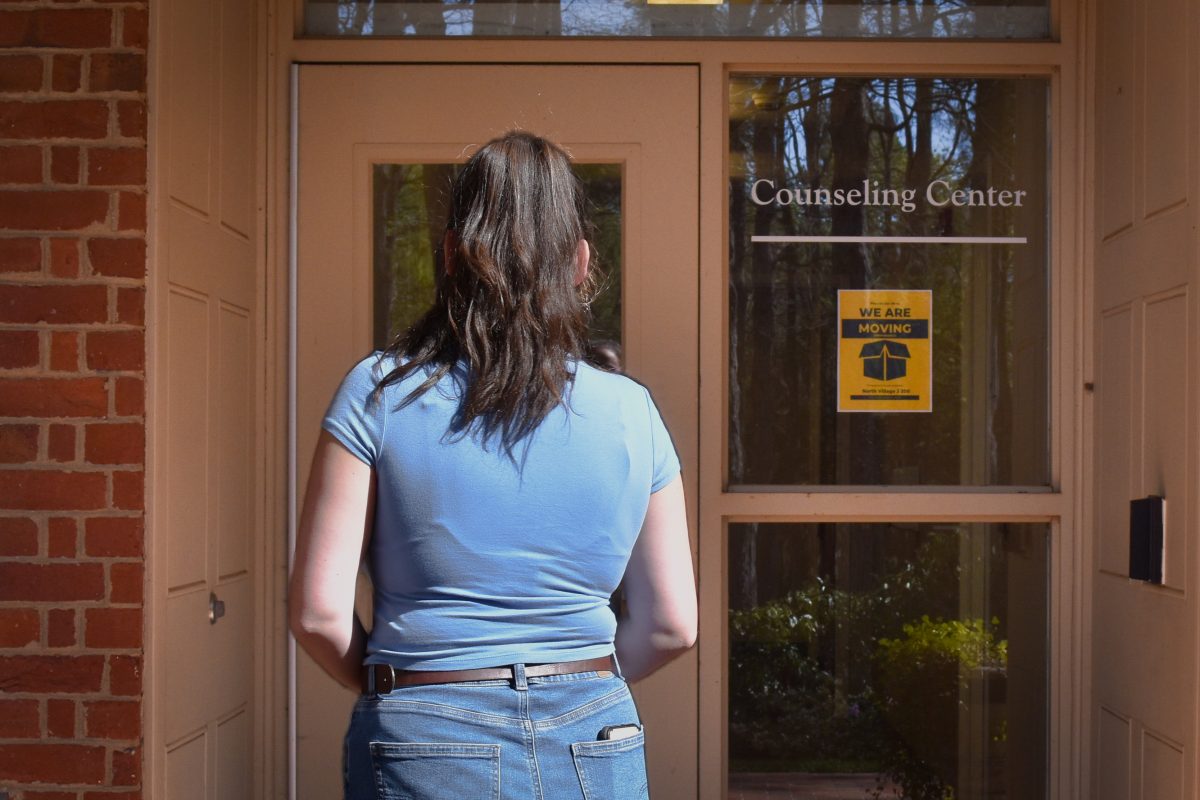*Anonymity was granted in two cases in which the source did not feel comfortable disclosing their name when speaking about their experience with Furman counseling.
When Furman students struggle with mental health issues, professors and Pathways advisers encourage them to make an appointment with the Counseling Center. Many students, however, are reporting problems with the quality of support.
Unpredictable walk-in support
One issue that students often report is unpredictable access to walk-in support. Sophomore Deniz Sarialsan attended the Counseling Center before such support was offered for non-emergencies. Freshman Sam Hart’s impression from Pathways was that students would be able to receive walk-in support for non-emergencies.
“The Pathways adviser said, ‘Yeah, you can just go in, and they’ll have somebody there to talk to you, and they’ll calm you down if you’re feeling anything upsetting.’ And so I go in expecting that,” Hart said.
Previously, emergency support was only available to students twice a day, at 10 a.m. and 2 p.m. At the beginning of the Fall 2022 semester, the Counseling Center created a Counselor on Duty role for students to have quick access to a confidential sounding board from 8:30 a.m. to 12 p.m., and 1 to 5 p.m., according to Tom Baez, Director of the Counseling Center.
Hart attended counseling last fall, but he was denied immediate support and instead had to make an appointment for the following week. The counselor then sent a Zoom link for what he expected to be an in-person visit. “Don’t sell it to me as if I can just walk in and there’ll be somebody there to talk to and calm me down when I have to wait a week to be on a Zoom call,” Hart said.
When sophomore Deniz Sarialsan sought walk-in support, he found that access was generally reserved for certain situations. “In my case, they asked if I had a life-threatening condition or an emergency such as suicidal thoughts. After I said no, they asked me to make an appointment and come back. But, they let me talk to a counselor when I insisted that it would be better if I could have a session at that moment,” Sarialsan said. “I just don’t think that’s the right approach.”
While understaffing has affected many counseling institutions across the nation since the pandemic, the Furman Counseling Center is fully staffed and has recently filled several new positions, according to Baez and Allyson Brathwaite-Gardner, Associate Director of the Counseling Center. Therefore, there may be other causes for why students are still struggling with non-emergency walk-in support.
Sticking to the survey
When students make an appointment, they are asked to fill out a survey touching on concerns such as depression, anxiety, academic distress, eating concerns and grief.
“After establishing rapport and informing the student about confidentiality, the counselor reviews the assessment results with the student and invites them to further elaborate on the areas identified for treatment,” Baez and Brathwaite-Gardner stated.
“It’s a long process, but it was really helpful for me, because it takes all that data from what you’ve answered and kind of compiles it in a way that’s easy to understand,” junior Reed Shoolbred said.
Other students felt the survey restricted what they could discuss at their appointment. “I had other things that I needed help with that just were not being addressed because it didn’t fit specifically within their criteria, which to me is not okay, because mental health is not gonna fit into a nice little box,” anonymous female senior 1* said. “There’s so many dimensions that were not addressed through that survey.”
According to Baez and Brathwaite-Gardner, these assessments are intended to help the counselor session time effectively. “I didn’t like that because I feel like as the person who is going to the counselor, I should be able to express what I want to express,” Sariaslan said. “My experience was she was kind of resistant to hearing what I wanted to say.”
For senior Heather Stroup, the meeting was more of a diagnosis than an opportunity for her to discuss what was of concern to her. “They would look at that (survey) and then come into that meeting and tell you like, ‘Okay, this is what’s wrong with you’, or ‘Oh, you have a lot of trauma,’ without really taking the time to get to know the individual outside of that piece of paper.”
Lack of compassion
In terms of counselors’ specific approaches to appointments, students report mixed experiences. “For me, it was just learning some tips and healthy habits in the sessions, and then applying those outside,” Shoolbred said. “The advice that I got, and the habits that I’ve learned from it have been helpful.”
Stroup also benefited from gaining positive coping mechanisms through her counseling, which lessened her anxiety.
However, other students report a lack of compassion among the mental health professionals. “With the first guy that I met with, he taught me a lot of practical things and how to challenge some of my thoughts. And then, [with] anybody else that I saw… it felt like sometimes my concerns were just written off and not really addressed,” anonymous female senior 1 said.
Senior Madison Oliverio reports that the meeting was mostly a one-way conversation. “It felt like they were asking me to tell them my deepest, darkest secrets,” Oliverio said. “There was no, ‘I’m so sorry this is happening,’ where I felt like they were empathizing with me, none of that. It felt like they had to write down what I was saying but weren’t actually caring.”
For some students, the counseling and psychiatric processes were rushed through and lacked a sense of genuine care. “I walked out with a packet and they’re like okay, good to go,” anonymous female senior 2* said. “It just made me feel like my problems were stupid, and like I shouldn’t be thinking about them.”
Having just received some bad news, Stroup noted the psychiatrist did not make an effort to relieve her anxiety. “The physician lacked that element of compassion, which I think is necessary,” Stroup said. “He was just like okay, here you go. Let me get you out the door and give you this prescription.”
Misunderstanding student needs
In addition to inflexible appointments and inconsistent quality of care, some students feel the counselors have misunderstood their needs regarding medication.
“I expressed to the Counseling Center, all I wanted was an (off-campus) therapist, I do not want a psychiatrist, I don’t want to jump to medication,” anonymous female senior 2* said. After working with the case manager for over a month, she was sent to a psychiatrist who made her feel “significantly worse.”
“I waited months to see (the Furman psychiatrist), and then he was like, I’m just gonna double your prescription. I could have asked my doctor to do that,” Oliverio said. “I didn’t want to double my prescription, because I didn’t want to be on a high dosage.”
Where students turn
These experiences are turning many students away from Furman counseling—each student interviewed by The Paladin who had a negative experience switched to off-campus therapists or called hotlines instead.
“It was definitely more helpful to go off campus, just because I think the big thing for me is it felt super depersonalized, and very let’s get you in and out, we got lots of people to see. Which is fair, but that’s not what I needed,” Oliverio said.
According to Baez and Brathwaite-Gardner, in August, Class of 1997 Furman alumnus David Trone donated $8.5 million to Furman for mental health services. “The impact of the Trones’ gift will kickstart a more integrative approach to mental health and launch us on a trajectory of prioritizing wellbeing as part of a student’s educational pathway,” Vice President for Student Life Connie Carson stated in a press release.
The gift will be used to renovate and expand Furman counseling into the “Trone Center for Mental Fitness” and is aimed at creating more group space for mindfulness practice and ensuring consistent professional staffing. It is unclear if this gift will address the call for counselor compassion and student agency in sessions.
“There needs to be a lot of just listening on the therapists’ part about what’s going on,” anonymous female senior 1* said. “Then, feedback about what types of things would be helpful to get somebody out of a specific headspace and teaching specific coping skills that are tailored to what the person is going through.”





































